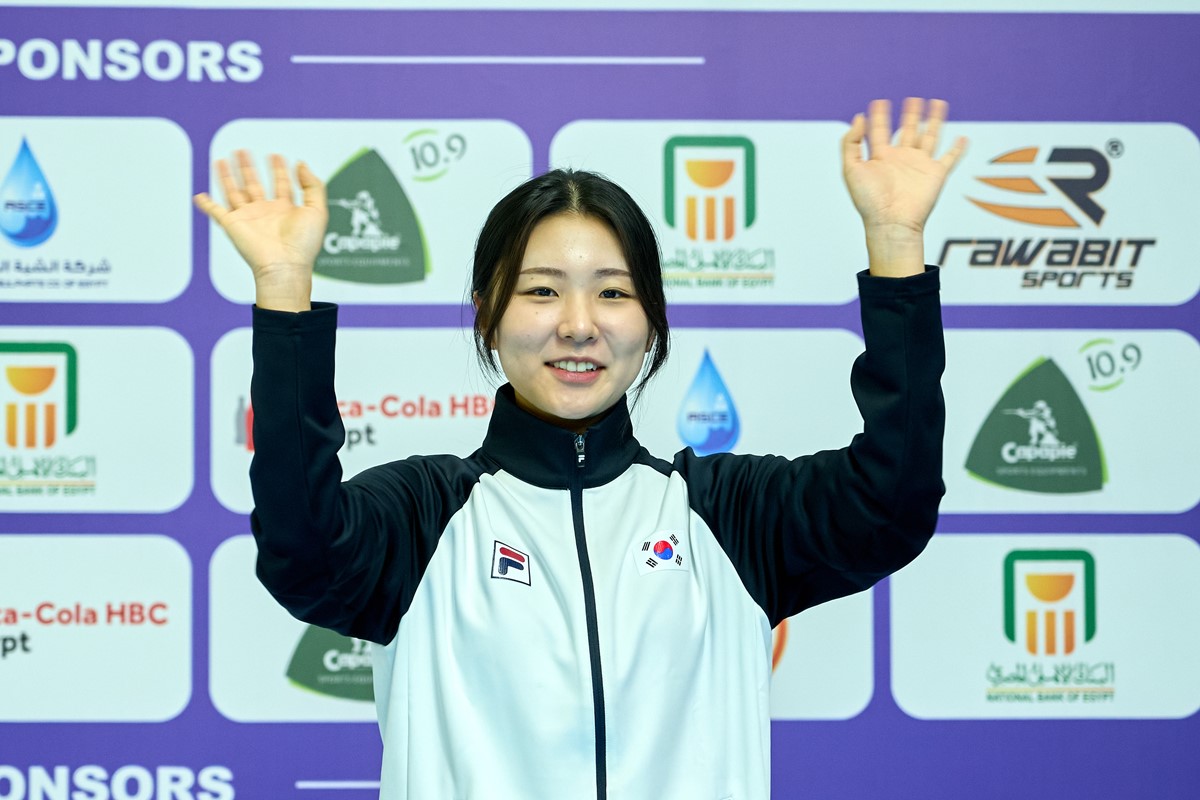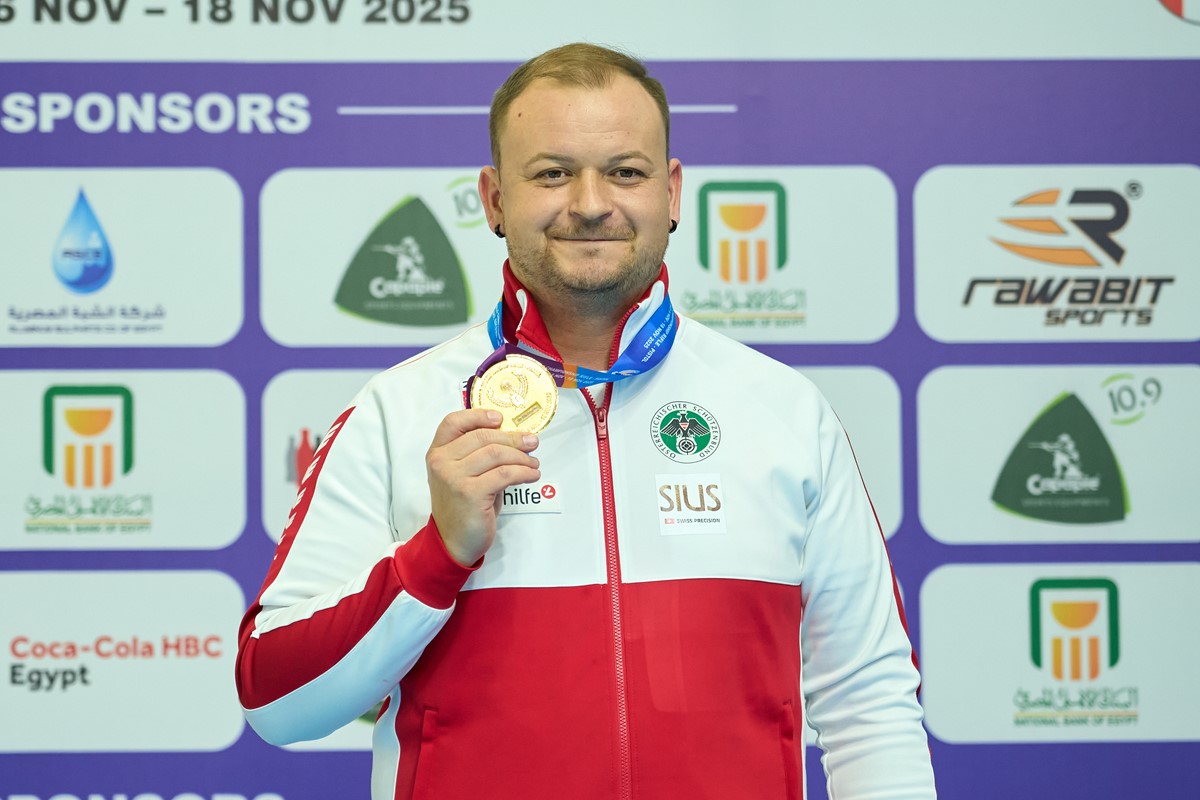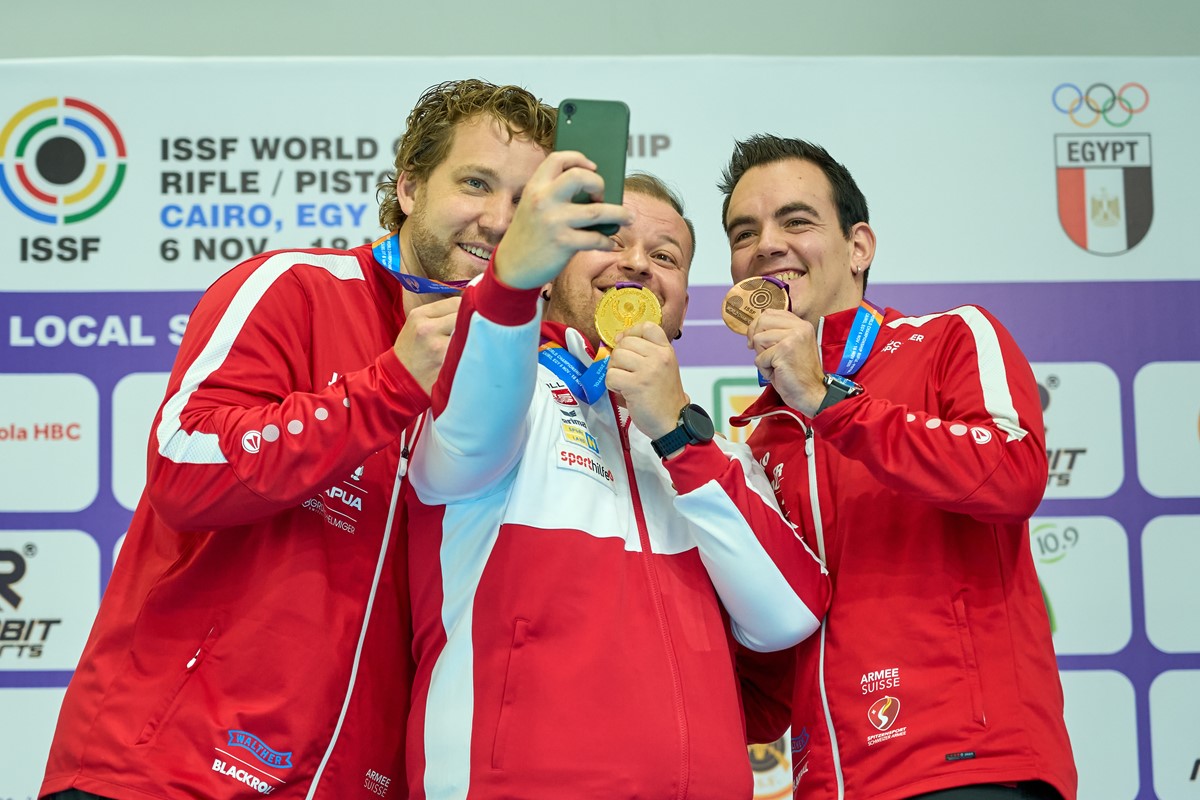Friday morning brought gold medals the way of the Republic of Korea and Austria in the women's and men's 50m rifle prone events, as Oh See-hee and Alexander Schmirl stood at the top of the podium at the 2025 ISSF World Championship Rifle/Pistol in Cairo, Egypt.
Oh was joined on the podium by 50m rifle 3 positions gold medallist Jeanette Hegg Duestad and Betina Ljunggren Petersen of Denmark; while it was a Central European podium in the men's event - as Swiss pair Jan Lochbihler and Fabio Wyrsch were second and third.
Oh was joined on the podium by 50m rifle 3 positions gold medallist Jeanette Hegg Duestad and Betina Ljunggren Petersen of Denmark; while it was a Central European podium in the men's event - as Swiss pair Jan Lochbihler and Fabio Wyrsch were second and third.

Women's 50m Rifle Prone
Oh See-hee had looked on for the medals in the women's 50m rifle 3 positions final before a tough ending dropped her down to fifth and out of the competition. Today, she made up for this, after a solid second half.
Her first series saw her sit in the top 10, with her teammate Lee Kye-rim and Switzerland's 50m rifle 3 positions silver medallist Emely Jaeggi sitting top on 105.4 to her 104.0. They were followed by Betina Ljunggren Petersen and Austria's Olivia Hoffman. While the Dane maintained her standard, Hoffman would quickly drop out of contention with a tough second series.
Oh would then score 104.6 to shoot up to second in the standings, but would be taken over by Petersen's compatriot Charlotte Jakobsen, who scored best of the round with 105.4. Jeanette Hegg Duestad remained consistent to stay in the top five, but both Lee and Jaeggi scored lower. Lee's 101.3 dropped her to the bottom half of the top 10, while Jaeggi's 102.7 was enough to keep her third.
Duestad, Jaeggi and Petersen shot well next to put themselves in contention with Oh, along with Kazakhstan's Alexandra Le who scored 105.0 in the third series. Meanwhile, Jakobsen's 101.8 dropped out of the top five with a score of 101.8.
Jakobsen's medal challenge ended with three scores below 104, which saw her drop to 19th by the end of the competition. For Jaeggi, her second half consisted of three totals below 103, ultimately placing 16th.
Oh's fourth series was the second best score of the competition, with a 105.5 - moving her top of the standings for the first time, with Duestad and Petersen close behind, as well as her Korean teammates Im Ha-na and Lee. Kazakhstan's Le's 102.9 would not be enough to keep up.
Oh's 104.9 and 104.3 kept the gap large enough to a strong-finished Duestad to win with a total of 626.5 to the Norwegian's 625.9. Petersen scored 104.5 and 105.3 to place third on 625.1.
Importantly, Petersen outscored Poland's Natalia Kochanska, who had a late surge to go level going into the final series. Both also leapfrogged Im and another athlete who had a strong second half, Slovenia's Urska Kuharic, who occupied third into the last series. Im and Kuharic finished in ninth and 10th after scoring 102.7 and 102.6 in the sixth.
Finland's Marianne Palo recovered from a low first series score of 102.1 to finish fourth - with his next five scores all over 104. Lee's second half included the best series score of the competition - a 105.6 in the sixth to finish on a high in fifth.
Oh, Lee and Im comfortably won the team title for the Republic of Korea with a score of 1872.8, followed by Denmark's Petersen, Jakobsen and Rikke Ibsen on 1866.1 and Norway's Duestad, Milda Marina Haugen and Mari Baardseng Loevseth on 1863.2.
Oh See-hee had looked on for the medals in the women's 50m rifle 3 positions final before a tough ending dropped her down to fifth and out of the competition. Today, she made up for this, after a solid second half.
Her first series saw her sit in the top 10, with her teammate Lee Kye-rim and Switzerland's 50m rifle 3 positions silver medallist Emely Jaeggi sitting top on 105.4 to her 104.0. They were followed by Betina Ljunggren Petersen and Austria's Olivia Hoffman. While the Dane maintained her standard, Hoffman would quickly drop out of contention with a tough second series.
Oh would then score 104.6 to shoot up to second in the standings, but would be taken over by Petersen's compatriot Charlotte Jakobsen, who scored best of the round with 105.4. Jeanette Hegg Duestad remained consistent to stay in the top five, but both Lee and Jaeggi scored lower. Lee's 101.3 dropped her to the bottom half of the top 10, while Jaeggi's 102.7 was enough to keep her third.
Duestad, Jaeggi and Petersen shot well next to put themselves in contention with Oh, along with Kazakhstan's Alexandra Le who scored 105.0 in the third series. Meanwhile, Jakobsen's 101.8 dropped out of the top five with a score of 101.8.
Jakobsen's medal challenge ended with three scores below 104, which saw her drop to 19th by the end of the competition. For Jaeggi, her second half consisted of three totals below 103, ultimately placing 16th.
Oh's fourth series was the second best score of the competition, with a 105.5 - moving her top of the standings for the first time, with Duestad and Petersen close behind, as well as her Korean teammates Im Ha-na and Lee. Kazakhstan's Le's 102.9 would not be enough to keep up.
Oh's 104.9 and 104.3 kept the gap large enough to a strong-finished Duestad to win with a total of 626.5 to the Norwegian's 625.9. Petersen scored 104.5 and 105.3 to place third on 625.1.
Importantly, Petersen outscored Poland's Natalia Kochanska, who had a late surge to go level going into the final series. Both also leapfrogged Im and another athlete who had a strong second half, Slovenia's Urska Kuharic, who occupied third into the last series. Im and Kuharic finished in ninth and 10th after scoring 102.7 and 102.6 in the sixth.
Finland's Marianne Palo recovered from a low first series score of 102.1 to finish fourth - with his next five scores all over 104. Lee's second half included the best series score of the competition - a 105.6 in the sixth to finish on a high in fifth.
Oh, Lee and Im comfortably won the team title for the Republic of Korea with a score of 1872.8, followed by Denmark's Petersen, Jakobsen and Rikke Ibsen on 1866.1 and Norway's Duestad, Milda Marina Haugen and Mari Baardseng Loevseth on 1863.2.

Men's 50m Rifle Prone
Consistency was key for Alexander Schmirl in the men's final, waiting for others to make mistakes to move up the table. His opener of 104.8 saw him tied for seventh, following the lead of Romanian Peter Sidi, whose 106.1 was the second-highest score of the competition - only behind the Bulgarian's Anton Rizov, whose 106.2 score came in the second series.
Sidi continued to hold to the lead after following up with 105.0, with the Austrian at this stage trailing by 1.9 in eighth. India's Akhil Sheoran and Jan Lochbihler sat in the other medal positions, followed by Sweden's Jesper Johansson, Zhao Wenyu of China, Anton Rizov and Czechia's Jiri Privratsky.
Yet, at the halfway stage - many of those contenders had a difficult 10 shots. Rizov's 102.3 would be his lowest score and the Bulgarian would not reach 104 again for the rest of the competition, finishing 21st. Johansson would not beat that threshold either, and his 103.4 would be the start of a fall down to 19th. Privratsky struggled with a best of 104.0, placing 30th. Sheoran's 103.6 would keep him in contention, but this was followed by a 102.4 - with the Indian placing 16th at the end. Most notably was the drop of Sidi whose 102.7 eviscerated his lead. While he scored 104.8 and 104.9 in the second half, a 102.2 would ensure he would not reach the medals and he finished 10th.
For Schmirl, his 105.9 brought him level with Zhao, who scored 105.3. Lochbihler's 104.7 was close behind with Hungarian Istvan Peni, who had a second score of 105 and above. Fabio Wyrsch came back into contention with a 105.0.
A 103.5 in the fourth dropped Zhao far below Shmirl's 105.3, as Peni moved into second ahead of the Swiss Lochbihler; but it looked as if the Austrian's gold medal hopes were dashed going into the last 10 shots after he recorded a score of 103.4. The closest challengers all fared better as Lochbihler closed the gap to him with a low score of his own - 103.7. A 2.3 swing in the direction of Peni - who scored 105.7 - gave him the lead, while Wyrsch would score 105.0 and above for the fourth consecutive series.
Peni and Wyrsch looked locked in for the gold, but both faltered at the end. Peni's 102.1 was the lowest series score of anyone in the top 30, while Wyrsch's 103.4 put him in danger to those chasing. For Schmirl, he performed when it mattered, finishing with a 105.3 to win the gold medal in dramatic fashion for a total of 629.1. Lochbihler's 104.8 ended up being good enough to claim the silver on a total of 628.1, pipping his teammate Wyrsch on 628.0. It was heartache for Peni who finished fourth on 627.7. Zhao and Liu Yukun of China finished fifth and sixth, with the consistent Liu always scoring 104.0 or above.
China would set a new world record in the team event, with Zhao, Liu and Li Muyuan all finishing in the top eight with a new best of 1881.3. Switzerland would also break the old world record of Poland - 1878.3 set back in 2019 - when Lochbihler, Wyrsch and Duerr finishing with the silver close behind on 1880.5. Norway's Ole Martin Halvorsen, Jon-Hermann Hegg and Jens Oestli took bronze with a total of 1874.7.
Consistency was key for Alexander Schmirl in the men's final, waiting for others to make mistakes to move up the table. His opener of 104.8 saw him tied for seventh, following the lead of Romanian Peter Sidi, whose 106.1 was the second-highest score of the competition - only behind the Bulgarian's Anton Rizov, whose 106.2 score came in the second series.
Sidi continued to hold to the lead after following up with 105.0, with the Austrian at this stage trailing by 1.9 in eighth. India's Akhil Sheoran and Jan Lochbihler sat in the other medal positions, followed by Sweden's Jesper Johansson, Zhao Wenyu of China, Anton Rizov and Czechia's Jiri Privratsky.
Yet, at the halfway stage - many of those contenders had a difficult 10 shots. Rizov's 102.3 would be his lowest score and the Bulgarian would not reach 104 again for the rest of the competition, finishing 21st. Johansson would not beat that threshold either, and his 103.4 would be the start of a fall down to 19th. Privratsky struggled with a best of 104.0, placing 30th. Sheoran's 103.6 would keep him in contention, but this was followed by a 102.4 - with the Indian placing 16th at the end. Most notably was the drop of Sidi whose 102.7 eviscerated his lead. While he scored 104.8 and 104.9 in the second half, a 102.2 would ensure he would not reach the medals and he finished 10th.
For Schmirl, his 105.9 brought him level with Zhao, who scored 105.3. Lochbihler's 104.7 was close behind with Hungarian Istvan Peni, who had a second score of 105 and above. Fabio Wyrsch came back into contention with a 105.0.
A 103.5 in the fourth dropped Zhao far below Shmirl's 105.3, as Peni moved into second ahead of the Swiss Lochbihler; but it looked as if the Austrian's gold medal hopes were dashed going into the last 10 shots after he recorded a score of 103.4. The closest challengers all fared better as Lochbihler closed the gap to him with a low score of his own - 103.7. A 2.3 swing in the direction of Peni - who scored 105.7 - gave him the lead, while Wyrsch would score 105.0 and above for the fourth consecutive series.
Peni and Wyrsch looked locked in for the gold, but both faltered at the end. Peni's 102.1 was the lowest series score of anyone in the top 30, while Wyrsch's 103.4 put him in danger to those chasing. For Schmirl, he performed when it mattered, finishing with a 105.3 to win the gold medal in dramatic fashion for a total of 629.1. Lochbihler's 104.8 ended up being good enough to claim the silver on a total of 628.1, pipping his teammate Wyrsch on 628.0. It was heartache for Peni who finished fourth on 627.7. Zhao and Liu Yukun of China finished fifth and sixth, with the consistent Liu always scoring 104.0 or above.
China would set a new world record in the team event, with Zhao, Liu and Li Muyuan all finishing in the top eight with a new best of 1881.3. Switzerland would also break the old world record of Poland - 1878.3 set back in 2019 - when Lochbihler, Wyrsch and Duerr finishing with the silver close behind on 1880.5. Norway's Ole Martin Halvorsen, Jon-Hermann Hegg and Jens Oestli took bronze with a total of 1874.7.

